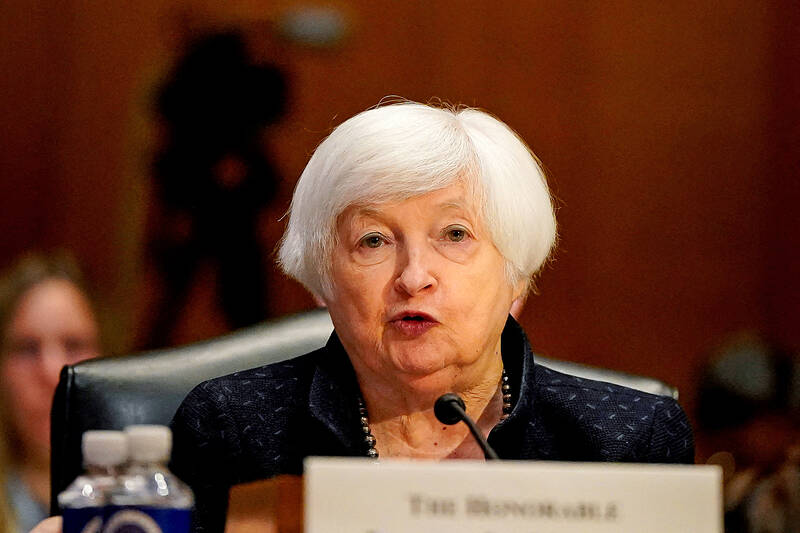US Secretary of Treasury Janet Yellen is calling out China’s ramped-up production in solar energy, electric vehicles and lithium-ion batteries, calling it unfair competition that “distorts global prices” and “hurts American firms and workers, as well as firms and workers around the world.”
Yellen, who is planning her second trip to China as Treasury secretary, said in remarks prepared for delivery yesterday in Georgia that she would convey her belief that Beijing’s increased production of green energy also poses risks “to productivity and growth in the Chinese economy.”
“I will press my Chinese counterparts to take necessary steps to address this issue.”

Photo: Reuters
China is the dominant player in batteries for electric vehicles and has a rapidly expanding auto industry that could challenge the world’s established carmakers as it goes global. The International Energy Agency, a Paris-based intergovernmental group, notes that China accounted for around 60 percent of global electric car sales last year.
Yellen’s remarks were to be delivered yesterday afternoon at Suniva Inc — a solar cell manufacturing facility in Norcross, Georgia. The plant closed in 2017 in large part due to cheap imports flooding the market, according to Treasury. It is reopening, in part, because of incentives provided by the Democrats’ Inflation Reduction Act, which provides tax incentives for green energy manufacturing.
The firm’s history is something of a warning on the impact of oversaturation of markets by Chinese products — and a marker of the state of US-China economic relations, which are strained due to investment prohibitions and espionage concerns, among other issues.
China on Tuesday filed a WTO complaint against the US over what it says are discriminatory requirements for electric vehicle subsidies. The Chinese Ministry of Commerce didn’t say what prompted the move.
The European Union, also concerned about the potential threat to its auto industry, launched its own investigation into Chinese subsidies for electric vehicles last year.
“In the past, in industries like steel and aluminum, Chinese government support led to substantial overinvestment and excess capacity that Chinese firms looked to export abroad at depressed prices,” Yellen said. “This maintained production and employment in China but forced industry in the rest of the world to contract.”
“These are concerns that I increasingly hear from government counterparts in industrialized countries and emerging markets, as well as from the business community globally,” she said.
The tone of Yellen’s speech stands in contrast to Chinese President Xi Jinping (習近平), who met with American business leaders in Beijing yesterday and called for closer trade ties with the US amid a steady improvement in relations that had sunk to the lowest level in years.
Xi emphasized the mutually beneficial economic ties between the world’s two largest economies, despite heavy US tariffs on Chinese imports and Washington’s accusations of undue Chinese Communist Party influence, unfair trade barriers and theft of intellectual property.

Intel Corp chief executive officer Lip-Bu Tan (陳立武) is expected to meet with Taiwanese suppliers next month in conjunction with the opening of the Computex Taipei trade show, supply chain sources said on Monday. The visit, the first for Tan to Taiwan since assuming his new post last month, would be aimed at enhancing Intel’s ties with suppliers in Taiwan as he attempts to help turn around the struggling US chipmaker, the sources said. Tan is to hold a banquet to celebrate Intel’s 40-year presence in Taiwan before Computex opens on May 20 and invite dozens of Taiwanese suppliers to exchange views

Application-specific integrated circuit designer Faraday Technology Corp (智原) yesterday said that although revenue this quarter would decline 30 percent from last quarter, it retained its full-year forecast of revenue growth of 100 percent. The company attributed the quarterly drop to a slowdown in customers’ production of chips using Faraday’s advanced packaging technology. The company is still confident about its revenue growth this year, given its strong “design-win” — or the projects it won to help customers design their chips, Faraday president Steve Wang (王國雍) told an online earnings conference. “The design-win this year is better than we expected. We believe we will win

Chizuko Kimura has become the first female sushi chef in the world to win a Michelin star, fulfilling a promise she made to her dying husband to continue his legacy. The 54-year-old Japanese chef regained the Michelin star her late husband, Shunei Kimura, won three years ago for their Sushi Shunei restaurant in Paris. For Shunei Kimura, the star was a dream come true. However, the joy was short-lived. He died from cancer just three months later in June 2022. He was 65. The following year, the restaurant in the heart of Montmartre lost its star rating. Chizuko Kimura insisted that the new star is still down

While China’s leaders use their economic and political might to fight US President Donald Trump’s trade war “to the end,” its army of social media soldiers are embarking on a more humorous campaign online. Trump’s tariff blitz has seen Washington and Beijing impose eye-watering duties on imports from the other, fanning a standoff between the economic superpowers that has sparked global recession fears and sent markets into a tailspin. Trump says his policy is a response to years of being “ripped off” by other countries and aims to bring manufacturing to the US, forcing companies to employ US workers. However, China’s online warriors